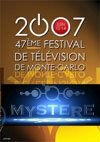 But music is not just a reminder. Its musical notes accompany the unfolding of the TV movie, evoke emotions, create an atmosphere, and color the scenes. During the 47th Monte Carlo Television Festival, we had the privilege of meeting the composer of TF1’s summer series (Zodiaque, Le Maître du Zodiaque, Mystère, which gathered over 9.4 million viewers last Wednesday), Frédéric Porte. Meet us at Karément on Thursday, June 15 at 9:15 am. Neither I nor he will be there. I will be late due to a bus delay, and he will be absent for… a reason that I will not reveal. Our musical encounter will take place an hour later over a shared breakfast.
But music is not just a reminder. Its musical notes accompany the unfolding of the TV movie, evoke emotions, create an atmosphere, and color the scenes. During the 47th Monte Carlo Television Festival, we had the privilege of meeting the composer of TF1’s summer series (Zodiaque, Le Maître du Zodiaque, Mystère, which gathered over 9.4 million viewers last Wednesday), Frédéric Porte. Meet us at Karément on Thursday, June 15 at 9:15 am. Neither I nor he will be there. I will be late due to a bus delay, and he will be absent for… a reason that I will not reveal. Our musical encounter will take place an hour later over a shared breakfast.
Nice-Première: I’ll let you set the tone for this interview.
Frédéric Porte: Very relaxed and very friendly.
N-P: It’s Thursday. It’s 10 a.m. The sun is already shining over Monte Carlo. What kind of background music would you play at Karément?
F.P.: Some pop. It’s very nice in the morning, it’s not as harsh as rap, which I find too violent. Pop is lighter.
N-P: Now that we’ve got a sense of the atmosphere at the venue according to Frédéric Porte, let’s focus on the composer. Let’s start with your origins.
F.P.: (Smile) Well, I come from a family of musicians. When I was younger, I wanted to do music for game shows. Why? No idea. Then, I turned to television series music. I prefer it to movie music. I attended the Versailles conservatoire. I studied composition, and I played the bassoon. At the same time, I started making short films for friends, but it wasn’t really my thing. I found television to have something more frivolous, a recurring aspect that isn’t present in movies.
N-P: So you prefer composing for television rather than movies. Why?
F.P.: The atmosphere in television is more friendly. You spend less time making music and as I am someone who likes to work quickly, it suits me well. I don’t like dragging things out. In TV, you have to work very fast. You give room to the moment and there isn’t too much reflection.
N-P: How do you compose music?
F.P.: (Smile) I don’t know. No. With a keyboard and two computers. I play a melody, I harmonize it, I work on it a little, and then I transcribe it onto a score in a computer.
N-P: You transcribe it onto a score manually?
F.P.: No, the computer transcribes it while I play. Thus, thanks to computers, we work faster. It allows us to let directors and actors listen to the music so they can get a sense of what we feel when they give us a film. In Mystère, there is a lot of action. We do more accurate work. When I deliver my work for a film, my music is pre-timed. Sometimes they are pre-mixed.
N-P: What did you feel when composing for “Mystère”?
F.P.: I didn’t read the script. You feel much more as the third author of a film. You get an overview of the first two authors, who are the screenwriter and director. You harmonize all their ideas. We receive emotions all at once. If we only read the script, we only get the screenwriter’s perspective and not that of the director, which is very important. The actor is also very significant. You can read a script as you read a book and then form an image that will be completely different.
N-P: How do you create music?
F.P.: I search. I work. I listen to a lot of music.
N-P: Dolmen, Zodiaque… The audience is starting to recognize your style of music.
F.P.: I’m really happy to hear you say that. Recently, a producer hesitated to hire me because he thinks I don’t have a very defined style. It’s entirely arbitrary to say that. For a music composer to fully utilize his talent, he must blend like a chameleon in any film as each film requires different music, or you become a very styled composer and they will only call you for that style, but then it becomes limiting. These series have an editorial line: big intrigue, big family…
N-P: What is your view on your colleagues?
F.P.: A lot of compassion and attention. We have a difficult job.
N-P: Would you like your compositions to be studied in school?
F.P.: Not really, I prefer to remain a “Mystery” (laughs). Honestly, having done a lot of musical analysis as a student, I always wondered if those composers asked themselves all the questions that we do. Often, I wondered if it wasn’t somewhat in vain. It’s interesting, it takes us elsewhere. The best would be to have a dialogue with the author.
N-P: It’s rare that the public knows what the composer of a film’s music looks like.
F.P.: I am discreet. I don’t think our profession needs to be publicized. I find it very good not to recognize a music composer in the street. We only recognize their music.
N-P: What is your mystery?
F.P.: I don’t have one. (Laughs) Without a but at this hour I do not know. You have to ask me again tonight after I’ve had a few drinks but for now, I can’t see any.
N-P: And the French Riviera, what does it inspire in you?
F.P.: Vacation. When I’m here, I don’t feel like doing anything. (Laughs) Since I arrived, I feel like I’m on the weekend. I am from the south. I am half Spanish, half from Marseille. But Monaco, I didn’t know when I was a child we didn’t go past Nice.
N- P.: So you know Nice?
F.P.: Yes, I have a small apartment there between the Palais de la Méditerranée and the Négresco. I love the Côte d’Azur. It’s a nice place. If I could, I’d stay there. But for work, you have to be in Paris but ultimately it’s not so bad, because when you come down, you appreciate it all the more.
Summer saga website: https://lachaine.tf1.fr/mystere/


